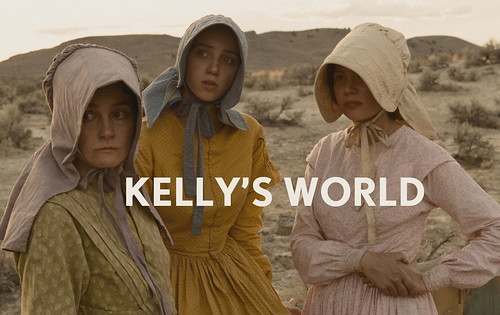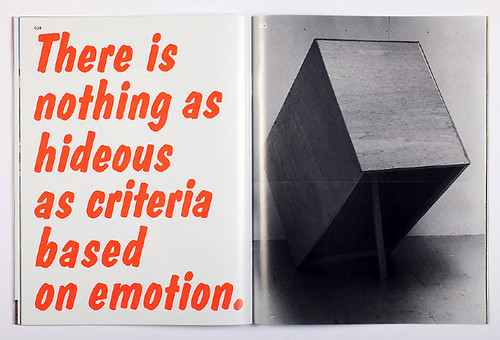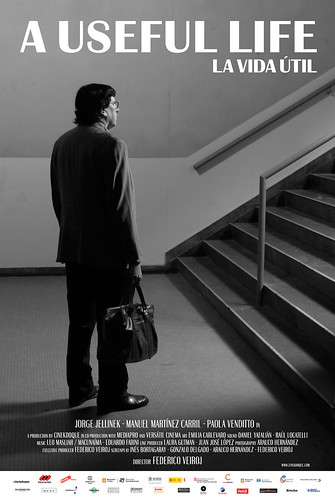SFIFF54 #5: Hear the words in here out there
by Ryland Walker Knight

Last week I had the pleasure of meeting Toronto's own Adam Nayman as he was in San Francisco on FIPRESCI jury duty for the festival. One of the fruitful conversations we shared was about Kelly Reichardt and her new movie, Meek's Cutoff, which, at first, made me madder than a snake. (What're spoilers?) The finest point to point at in my reaction to the film is its ending, which is exactly the kind of storytelling move that I've grown to detest: that seemingly open-ended "grace note" that feels if not over-determined then a cop-out. I complained to another friend that, if you're going to write a story about life and death consequences (risking starvation) on the road to the frontier, then you ought to make some real choices about trajectory, about what those consequences mean; and that it appeared Reichardt "copped out" on any such choices by opting for a "mystic allegory" that makes the film's alarmingly literal lefty slant unavoidable and, well, without argument beyond what I already know about how confused and confusing humans can be. That is, the political element is as rootless as the characters, awash in reaction not conviction. After all, the majority of the film made me angry because the way Meek is characterized—the ignorant blow hard wearing a red shirt quick to beat The Other he refuses to grant any value, let alone agency—leaves little room for interpretation outside allegory when met at first glance (1). But I must admit that not only was I rapt through the plodding but also that I marvel at Reichardt's gift for film grammar and staging. And, yes, that, while grimacing my way through the post-screening talks, trying and failing to bite my angry tongue, I tried to add to every exchange that I did not trust my basic reaction because it felt reductive and far too broad (funny how those dovetail!) for a film this specific.
When Adam and I started talking about the film a few days later nobody had presented any kind of argument to get me out of my funk with the film. I still explained the anger in terms of expecting the ending: "In that reverse shot through the trees, looking at the Indian, before the penultimate one of Williams, I was thinking, Please don't do it, and then you get Williams' face—did you realize her lips are perfect no matter what?—and she's all 'confused' or whatever before the final reverse, this time with less leaves, and I kept thinking, Don't fucking do it, and then it starts down, starts to fade, and I'm a riot inside, just totally, You fucking did it, didn't you? And I wanted to bolt from the theatre." Adam's reply was as simple as it was brilliant, one of those, ouch, I-should-breathe-better moments where your jaw doesn't drop but your mouth does open. He asked, "Does it matter that it's Williams' point of view, looking through those trees, to you?" My head went click and thud, my eyes widened and I said, "Huh, well, okay. Yes, of course that matters. How did I not think of that?" It's not like that question precipitated a complete reversal but it did open a new way to appreciate the film, or, at the very least, a way to let my useless anger abate. Because I'm still not sold on it, nor Reichardt, though I do like being forced to think about a movie, about a filmmaker, about my criteria, about myself. Thinking about thinking and thinking about how you are thinking are rather indulgent modes, I suppose, but that's all I understand criticism to be at bottom. Or, that's the kind of philosophical criticism I'm attracted to: the kind that brings intentionality into play while guiding a reader through one's experience of an object. I realize that ideal is not always possible, or desirable.

Part of what makes it improbable is that sense of duty a critic feels inside a festival's screening schedule not only to see as many films as possible but also to have something to say about all those free tickets she's received (2). "Duty" may be the wrong word, however, when what's really motivating me (I can only speak for me) is that I simply like going to the movies. But, in turn, I guard that enthusiasm by not going to the movies. (In fact, after Meek's, I only saw five films of the fifteen I'd planned (via iCal) to see. There were a lot of reasons, but the truth of the matter is that I wanted to watch basketball more than I wanted to watch movies. Luckily, this is something Adam is amenable to since he is, among other things, a big basketball fan as well. We will return to this.) Which gives me pause on the eve of my first visit to the Cannes Film Festival. I'm in Nice writing this and though my fatigued body wants to stay inside and lay down or get into some stretching, my brain wants to push that body outdoors as often as possible to feel a different sun and speak a different language walking around a city I do not know. Granted, I'll have a running mate in Danny at the festival and I don't doubt some odd kind of competition will push me to see more and write more than normal. Yet, no matter how flat out cool it is to the fan in me that I get to participate in this festival this year, the sun will always tempt me. Which is another motivating factor to pump out this post to wrap up my SFIFF54.
Thus, to regain the thread: I enjoyed Adam's question of perspective because it brought back a rather basic question I'd forgotten in the haze my eyes had created, reacting to the simple story onscreen in Meek's. Because that is the great thing at work in the film: bringing this woman's eyes to the fore. Her gaze may not be clear, or always level, but she's the moral rock of the picture and by the close she has, in fact, been brought from the back of the wagon ditching heirlooms to the center of the frame with a voice and a face for all to reckon. This reading, too, is reductive of course. But I'd much rather value the film for its picture of a woman emerging than disparage a film for its (by my lights) lazy storytelling. Reichardt may not be interested in story the same way I am, I must allow, since she has a certain a-g background that speaks to interests in space and time (both paramount abstractions here), but the fact is she chose to make a narrative feature that is only ever subtle in its patient formal craft, not its ideas, and that still bugs me. Then again, all three of Reichardt's Oregon pictures are on the cynic's side of the table and part of my problem may simply be my desire for a more generous world, my desire to see some new way towards charity. Put otherwise, I know I rate magnanimous movies higher for their obvious alignment with my own values. This may be selfish.
This is also why I love something like Claire Denis' 35 Rhums, which is nothing if not charitable. So imagine my thrill to meet Stuart Staples of Tindersticks prior to their event at the festival, adding a live score to a sort-of clip-reel of films they have worked on with Mme Denis. Our chat was brief but I can assure that Mr Staples is a gentle and patient man. He talked about a duty, too, he feels to the object at hand, to do right by it by the end of the process. On their first score with Mme Denis, for Nenette et Boni, he said the band had the idea that they would follow in Miles Davis' footsteps by trying to play live to the images, to be real jazz musicians, before they realized it would take time to find apt melodies and write real songs where needed. Now, he says, they get ideas earlier thanks to the script and dailies but it really takes seeing a rough assembly to have the kind of emotional reaction necessary to inspire his/their/that responsibility to the object that can produce such wonders as the delicate, lilting rhymes of the opening image-and-score tandem of 35 Rhums, where the train and its tracks shuffle a bit in time with the accordion. Or the title track from the soundtrack to Trouble Every Day, which was a highlight of the live performance (3) along with the song "Tiny Tears" from that first partnership on Nenette et Boni. Lucky for us, somebody talented shot that part of the show, its finale, and put it on youtube:
It was a low-key event. But it was certainly more about the concert than it was about the visuals (or the interplay between stage and screen) from my vantage. Which is fine, of course, since I feel privileged to live in one of the two U.S. tour stops for the show. And the music is really great, no matter how much I wanted to re-order things or at least open with more of a bang than that (admittedly lovely) shot of Alice Houri floating in the pool near the front of N&B. So I'll quit that tact by saying, Thanks.
Some other things I was grateful to catch on a big screen before departure include: Ben Russell's Trypps #7, which really did start its shorts program with a bang (or a bong, or a gong), as it took me forever to figure out we were looking in a mirror at that lady's face stay placid in the quivering frame; T.Marie's Slave Ship was projected smaller than the rest of the series but it still impressed the hell out of me because it flips the "watching paint dry" quip into something productive, forcing us to see an image not take shape but explore its own variance; The Mill and The Cross by Lech Majewski is somewhat confounding, especially from the 2nd row, but its palate is wide and deep and its ideas, though rooted in the narrative structure of the painting, feel yet more modern in how arrayed (not inter-related) they are, but then maybe Breugel was just ahead of his time (in any case I was too tired to offer a more cogent take); Michelangelo Frammartino’s Le Quattro Volte is by turns cute and brilliant, with far more whimsy than any note could prepare me for, which isn't a bad thing since we should welcome some levity inside a largely wordless observation on cycles of life (it's not Disney, ok, though its like-minded brevity is a blessing) that still exist outside cities; Breillat's The Sleeping Beauty is nowhere near Disney and so full of stuff that I can't say what I think other than I like how she sees a dream life in a similar way to Lynch on a thematic level if nowhere close on a stylistic or formal level; and, finally, that big bad momma of some smoke and a shitload of mirrors, RWF's World on a Wire.
Believe me, I'm sorry to have missed plenty, but at the least I saw this large-scale goof of a thesis on modernity that's so funny and smart it's hard to believe people get daunted by its size. It's the kind of movie all cinephiles will enjoy, if not adore, and the kind they can never sell to non-movie-people they love. The running time is unavoidable in any description one might try to entice with due, in part, to the fact that the film just keeps getting better as it goes along, accruing incidents of insanity designed for maximum punchline effect. The gambit is easy enough, though, and largely ripped off: there's a government-funded project to build a computer world that mimics our own with a series of programmers, each holding the (invisible marionette) strings on fabricated subjects, going mad when they realize the very apocryphal truth of their own reality. Sounds familiar, huh? Well part of the joy in the thing is precisely its lower case, 16mm filmmaking that relies on performance and structure and sound design with very minimal set decoration to get at a sense of a future just past our present (even if the costumes are unmistakably 1973)—as well as a world enveloping itself. I'm astounded this is only the second Fassbinder film I've seen. But that just gives me another autodidact project, among so many, for after Cannes.
The trick is to step out of such impulses, though, when you're in a foreign country (4) (5) and look how I've failed today, spilling so many words. Whatever, I say; I say, my body saw the sun this morning—for a stroll to the market and beyond, for a lunch in the park and for a snack on the patio at my hotel with the owner. So out I go again, hoping for a cheap pizza and some good wine on a sidewalk where I can watch people in clean clothes try their best to act like they don't have a million eyes on them at all times, or actually convince themselves their lover's the only one looking at them—and only them!—in the world.

—Happy Mothers Day, moms
(1) He's an easy Bush stand-in, if I must use that name, and Michelle Williams' character has a line of dialog that only helps cement this link: "I don't know if he's ignorant or just plain evil."
(2) Not to mention the fact that you want to ply press people with clips to quiet at least one chorus of voices ringing in one corner of one ear.
(3) However, the selection of the man-eating scene was, as S.S. promised, shocking. Even when you see that scene in the context of the greater film it's brutal, gross and nigh gratuitous. Here, it rankled more than most and, again, I looked away for the duration, though that didn't spare me the sounds of the horny young dude screaming and choking and bleeding to death.
(4) I'll be in Europe for a while post-Cannes.
(5) That's the trick anywhere, I think, which is part of the point of World on a Wire: you should want to want your own body, you should want to live in it, you should want to move it and slap windows with delight at movement and light.








